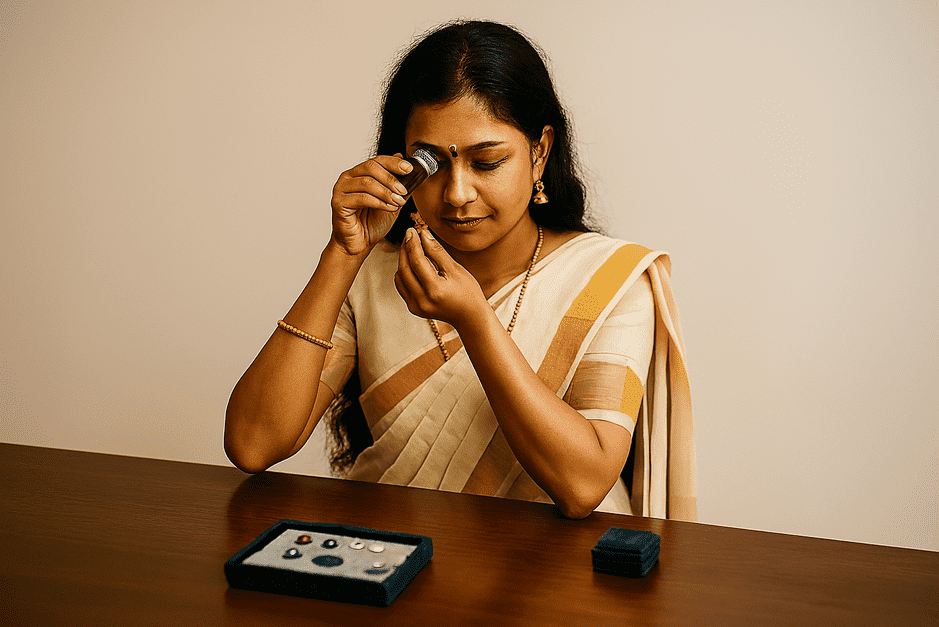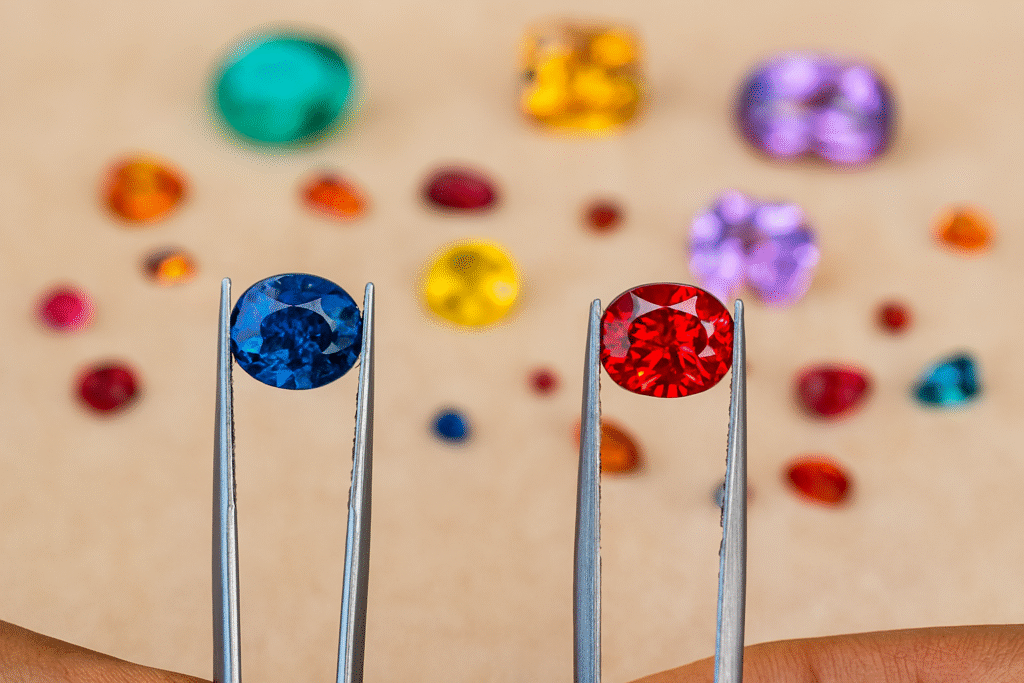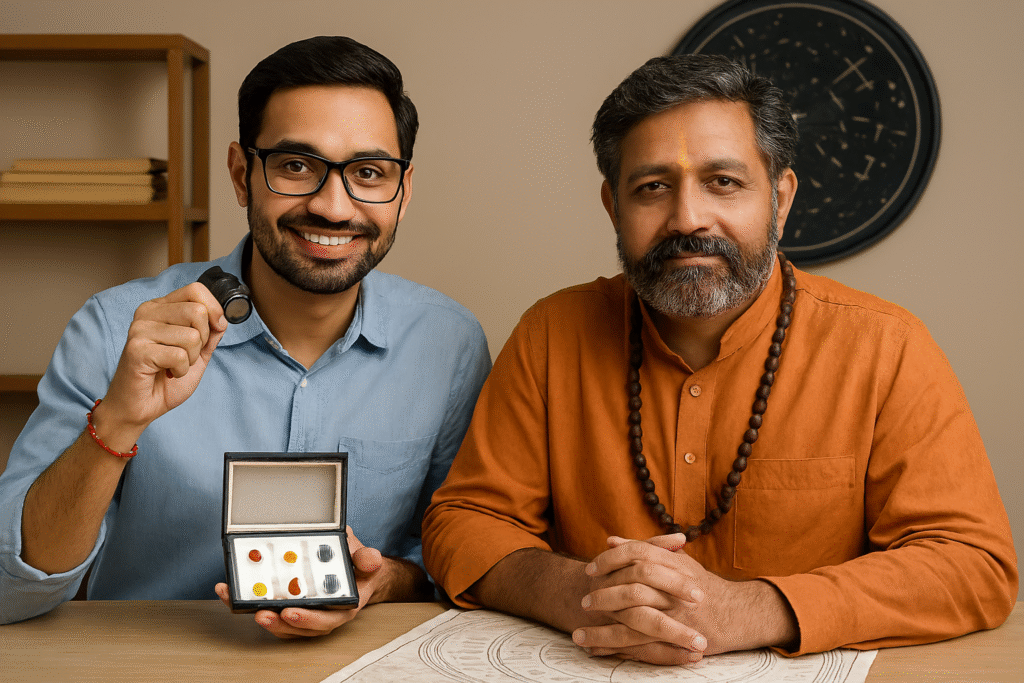Introduction
Wishful thinking in gem identification is one of the most dangerous traps in gemology. When you want a stone to be valuable, confirmation bias can blind you to evidence that proves otherwise. This guide explains how to avoid the costly mistakes that come from desire overriding discipline.
Is Wishful Thinking the Most Dangerous Trap in Gem Identification?
What You’ll Learn
- What wishful thinking means in gem identification
- How confirmation bias in gemology leads to mistakes
- Real-world examples of gem identification errors
- Practical steps to avoid bias when buying or testing gems
The Psychology Behind the Trap
Wishful thinking in gem identification happens when someone wants a stone to be valuable and ignores contradictory facts. In psychology, this is called confirmation bias. A green stone may be accepted as emerald, even if inclusions suggest it is glass.
Costly Real-World Examples
- A ruby worth $250,000 at auction turned out to be synthetic. The buyer admitted his wishful thinking stopped him from requesting lab verification.
- In Bangkok, a dealer spent $40,000 on “emeralds” that testing later proved were dyed quartz.
These cases show why gem buyers must resist bias.
How to Avoid Wishful Thinking in Gem Identification
- Use multiple tests (refractometer, spectroscopy, fluorescence).
- Always request a gemological lab certificate before major purchases.
- Ask yourself: “Am I ignoring evidence because of wishful thinking?”
. To understand similar risks in precious metals, see 24K, 22K, 18K: What Every Malayali Gold Buyer Must Know.
Expert Insight
After four decades in gemology, I’ve learned that discipline protects you more than equipment. The key is: evidence must always outweigh emotion.
For related reading, check Understanding BIS Hallmark: What It Means for Your Jewellery and How to Sell Gold in Kerala Without Losing Value.
Learn More:
- Psychology reference on confirmation bias.
- GIA (Gemological Institute of America) about gem identification reports.
Small Luxury Hotels FAQ
Introduction
This small luxury hotels FAQ answers common questions about boutique stays. It explains definitions, differences with large chains, and which services to expect. In addition, it covers family options, sustainability, and tips on finding the right property.
What defines a small luxury hotel?
- Fewer than 100 rooms.
- Personalized attention and privacy.
- Strong links to local design.
- Locations in unique urban or rural areas.
As a result, travelers often choose them for a more intimate experience. Moreover, their distinctive style sets them apart from standardized hotels.
Why choose a small luxury hotel?
Personal service
Staff remember guest details, therefore creating a sense of familiarity.
Calm spaces
Unlike large hotels, these properties feel quieter, so you can relax more easily.
Local culture
For example, menus highlight regional produce, and interiors reflect local crafts.
In addition, many guests return because the experience feels authentic.
How do small luxury hotels differ from large chains?
Guest experience
Small hotels provide tailored attention, while chains rely on uniform systems.
Property identity
Each boutique hotel has its own theme. On the other hand, large chains repeat formats worldwide.
Dining approach
Menus change seasonally and locally. Therefore, guests enjoy fresh variety instead of standard global menus.
Are small luxury hotels only for leisure stays?
Business features
- Lounges double as meeting rooms.
- Private dining options support work dinners.
Digital needs
- Fast Wi-Fi supports remote work.
- Quiet spaces help concentration.
Because of these advantages, small luxury hotels appeal to both business and leisure travelers.
What services can you expect?
- Concierge services for tours and dining.
- Fine dining menus with seasonal ingredients.
- Spa and wellness treatments.
- Added extras like minibars and welcome gifts.
Moreover, services shift depending on location. For example, a city hotel might offer cultural tours, while a rural retreat offers farm experiences.
Are small luxury hotels family-friendly?
Options for families
- Connecting rooms for parents and children.
- Child-friendly amenities such as menus or games.
Adults-only stays
- Some properties focus on privacy.
- Guests find peaceful, child-free environments.
Therefore, always check booking policies, because each hotel sets its own approach.
Do these hotels support sustainability?
Sourcing and dining
Farm-to-table meals reduce transport impact. In addition, guests enjoy fresher produce.
Environmental focus
Plastic use is restricted, while refillable bottles are encouraged. Smart energy systems reduce wastage.
Local involvement
Hotels support the community by hiring regionally. As a result, growth extends beyond the property.
How do you find the right small luxury hotel?
Define needs
Decide if food, spa, culture, or privacy is your top priority.
Check guest feedback
For example, repeat reviews about service often signal consistency.
Compare value
Packages may include meals, transfers, or early check-in. Therefore, higher prices can still deliver stronger value.
Are small luxury hotels worth the price?
Value of service
Guests pay for attention, comfort, and privacy. Moreover, experiences feel tailored and unique.
Extras add value
Some hotels include exclusive experiences or benefits. Finally, weigh these extras against nightly rates.
As a result, many travelers feel these hotels justify their price when quality matters most.
- 【Professional Design】This refractometer is specially designed to measure the refractive index of gemstones and solid mat…
- 【High Quality】Quality all metal construction, low battery consumption can be used for a long time.Approved by strict qua…
- 【Package Contents】Built-in LED flashlight, 30x jewelers loupe in silver housing, one of the most important gemstone iden…




